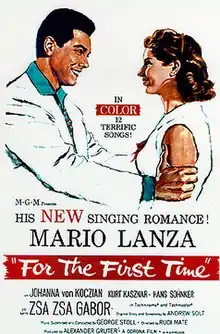| For the First Time | |
|---|---|
 | |
| Directed by | Rudolph Maté |
| Written by | Andrew Solt |
| Produced by |
|
| Starring | |
| Cinematography | Aldo Tonti |
| Edited by | Gene Ruggiero |
| Music by | George Stoll |
Production companies |
|
| Distributed by | |
Release date | 26 August 1959 |
Running time | 92 minutes |
| Countries |
|
| Language | English |
| Budget | $500,000[1] |
| Box office | $1,685,000[1] |
For the First Time (German title: Serenade of a Great Love) is a 1959 musical film directed by Rudolph Maté and starring Mario Lanza, Johanna von Koczian, Kurt Kasznar, and Zsa Zsa Gabor. It was tenor star Mario Lanza's final film, released by Metro-Goldwyn-Mayer six weeks before his death. The film tells the sentimental story of an operatic tenor (Tony Costa) who finds love for the first time with a young German woman (played by Johanna von Koczian), who happens to be deaf.
It was shot at the Spandau Studios in Berlin and on location in 1958 in Capri, Salzburg, Berlin and at the Rome Opera House. The film's sets were designed by the art directors Hans Jürgen Kiebach, Fritz Maurischat and Heinrich Weidemann.
Reception
Critics singled out Lanza's singing of "Vesti la Giubba" from Pagliacci and the Death Scene from Otello for special praise, with Howard Thompson of The New York Times calling it the tenor's "most disarming vehicle in years."
Cast
- Mario Lanza as Tonio Costa
- Johanna von Koczian as Christa
- Kurt Kasznar as Tabory
- Zsa Zsa Gabor as Gloria De Vadnuz
- Hans Söhnker as Prof. Bruckner
- Annie Rosar as Mathilde Faktotum
- Sandro Giglio as Alessandro
- Walter Rilla as Dr. Bessart
- Renzo Cesana as Angelo
- Peter Capell as Leopold Hübner
Music
Music plays a major role in the film. The following compositions can be heard:
- La donna e mobile and Un di, se ben rammentomi… from Rigoletto by Giuseppe Verdi
- Come prima ( For the First Time ), a hit by Panzeri, Di Paola and Taccani
- Oh, Capri, a Tarantella , and the Jamaica-Rock Pineapple Picker by George E. Stoll
- O sole mio, a Neapolitan folk tune
- Lachterzett from the opera Così fan tutte by Wolfgang Amadeus Mozart
- Vesti la giubba from I Pagliacci by Ruggiero Leoncavallo
- I love you by Edvard Grieg
- Death scene from Othello by Giuseppe Verdi
- Ave Maria by Franz Schubert
- Je n'en connais pa la fin by Marguerite Monnot
- Triumphal march from Aida by Giuseppe Verdi
- Who was once in Munich by Bette/Hauff
In addition to the main actor, soloists, the choir and orchestra of the Roman Opera and the Vatican boys' choir sing and play. George E. Stoll, who also contributed two of his own songs, was responsible for directing the music.
Box office
According to MGM records the film earned $710,000 in the US and Canada and $975,000 elsewhere, resulting in a profit of $1,685,000.[1]
See also
References
Cesari, Armando. Mario Lanza: An American Tragedy (Fort Worth: Baskerville, 2004).
External links
- For the First Time at IMDb
- For the First Time at AllMovie
- For the First Time at the TCM Movie Database
- For the First Time at the American Film Institute Catalog
- For the First Time: Lanza's Sweet Little Swansong, by Derek McGovern